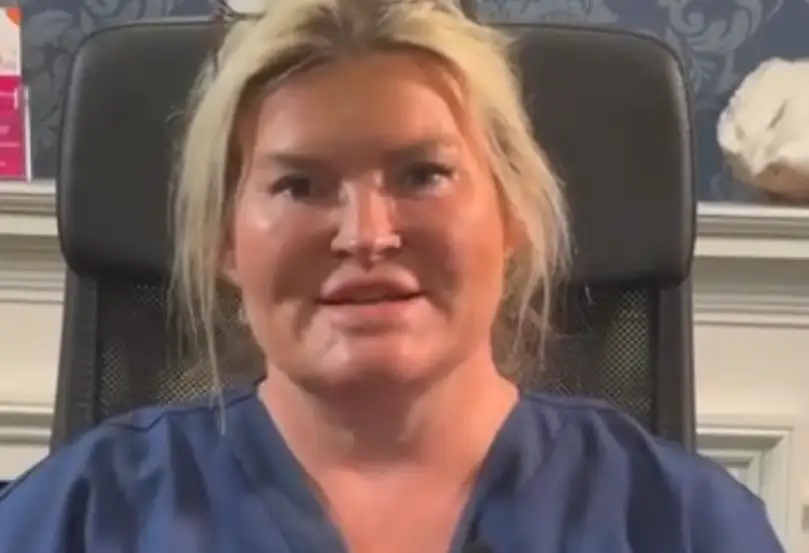Loss of libido during menopause
Menopause, a natural stage in a woman’s life, brings about a cascade of changes in her body. One of the most distressing changes many women experience during this time is a loss of libido.
Imagine feeling a deep disconnection from your own body, as if your desires have vanished into thin air. The once vibrant and passionate woman now finds herself struggling to even summon a flicker of desire. It can be a confusing and isolating experience, leaving many women feeling inadequate or unattractive.
The loss of libido during menopause can be attributed to several factors. Hormonal fluctuations play a significant role, as declining levels of oestrogen can lead to vaginal dryness and decreased sensitivity. Psychological factors, such as stress or changes in body image, can also contribute to this loss.

Understanding the Loss of Libido
Libido, also known as sexual desire, is a vital aspect of human sexuality. It is the driving force that ignites intimacy and passion within a relationship. However, various factors can lead to a loss of libido. Menopause, for instance, can have a significant impact on a woman’s sexual desire due to hormonal changes. Additionally, lifestyle factors such as stress, lack of exercise, and poor diet can also contribute to a decrease in libido during menopause.
What is Libido?
Transitioning from the previous section, where we explored the various factors that can contribute to a loss of libido, let us now delve into understanding what exactly libido is and its significance in our lives.
Libido, often referred to as sexual desire, is a fundamental aspect of human nature that encompasses our innate drive for intimacy and sexual satisfaction. It is an intricate tapestry of emotions, physical sensations, and psychological factors that come together to create a profound longing for sexual connection. Like a delicate dance between mind and body, libido manifests itself differently in every individual, influenced by a myriad of internal and external factors. It is this intricate interplay that can make understanding and addressing a loss of libido during menopause a complex and nuanced process.
What Causes the Loss of Libido?
As we delve into the complex world of libido, it is important to understand the factors that can cause its loss. The loss of libido can be a distressing experience, leaving individuals feeling disconnected and frustrated. Various factors can contribute to this decline, such as hormonal imbalances and medical conditions. Hormonal imbalances, such as a decrease in oestrogen and testosterone levels, can significantly affect one’s sexual desire. Additionally, medical conditions like depression, anxiety, and chronic illness can dampen libido, as they consume the individual’s physical and emotional energy. Certain medications can also have an impact, as they may interfere with hormone production or cause side effects that decrease sexual desire.
The Effects of Menopause on Libido
As menopause sets in, women may find themselves facing a myriad of physical and emotional changes. One significant aspect that often gets affected during this time is libido – a person’s sexual desire or drive. Menopause can have a profound impact on a woman’s libido, causing it to wane or even disappear altogether.
The hormonal changes that occur during menopause are primarily responsible for the decreased libido. As oestrogen levels decline, the tissues in the vagina may become thinner and dryer, leading to discomfort and pain during intercourse. This physical discomfort can significantly dampen a woman’s desire for sexual intimacy.
*Furthermore, menopause can bring about emotional and psychological changes that also contribute to the loss of libido.
Diagnosing the Loss of Libido
Diagnosing the Loss of Libido requires a thorough investigation into various aspects of a person’s life. Medical History plays a crucial role in understanding any underlying conditions or medications that may contribute to the problem. This is followed by a comprehensive Physical Examination, where the healthcare professional assesses the overall health and looks for any physical abnormalities. Laboratory Tests are conducted to check hormone levels, blood count, and other relevant factors. In addition, discussing Lack of sexual desire or interest and Relationship issues helps to unravel the psychological and emotional aspects that might be affecting one’s libido.
Medical History
As we delve into the diagnosis of the loss of libido, we must first explore the patient’s medical history. This crucial step allows healthcare professionals to gain insight into potential underlying causes that may contribute to the decline in sexual desire. By meticulously reviewing the patient’s medical records, including past illnesses, surgeries, and medications, a comprehensive understanding of their overall health is obtained. Additionally, an empathic approach is crucial during this process, as patients may feel vulnerable discussing intimate details. Physicians must create a safe space, encouraging open and honest dialogue to uncover any potential medical conditions that may be impacting their libido. The medical history serves as a foundation, guiding healthcare providers towards a thorough and accurate diagnosis.
Physical Examination
As we delve deeper into diagnosing the loss of libido, a thorough physical examination becomes an integral part of the process. This examination entails a comprehensive assessment of the individual’s overall health and well-being, aiming to identify any underlying medical conditions that may contribute to the decline in sexual desire.
During the physical examination, the healthcare provider meticulously examines the patient’s body, paying close attention to any physical abnormalities that may be causing or exacerbating the loss of libido. They might assess vital signs, evaluate hormonal imbalances, and inspect the genital region for any signs of infection or anatomical issues.
*The physical examination also allows the healthcare provider to gauge the patient’s overall health, as certain medical conditions such as diabetes, obesity, or cardiovascular disease can have a profound impact on sexual desire.
Laboratory Tests
Laboratory Tests can be an important tool in diagnosing the loss of libido. These tests can help identify any underlying medical conditions that may be contributing to the decrease in sexual desire. Common laboratory tests that may be ordered include hormone level testing, such as testosterone and prolactin levels, as well as thyroid function tests. Hormonal imbalances, such as low testosterone or high prolactin levels, can have a significant impact on a person’s libido. Thyroid disorders, such as hypothyroidism, can also lead to a decrease in sexual desire. Additionally, other laboratory tests may be performed to evaluate overall health and rule out any potential underlying medical conditions. These tests may include a complete blood count (CBC), lipid panel, and liver function tests.
Treatment Options
There are various treatment options available for addressing sexual health issues, such as hormone therapy, herbal remedies, psychological counseling, lubricants and moisturizers, and sex therapy. Hormone therapy involves the administration of hormones to balance the levels in the body, which can help alleviate symptoms like low libido. Herbal remedies offer natural alternatives, harnessing the power of plants to support sexual health. Psychological counseling can be beneficial for individuals dealing with emotional or psychological factors that may be affecting their sexual well-being. Lubricants and moisturizers provide relief from vaginal dryness and discomfort.
Hormone Therapy
Hormone therapy, a common treatment option for those experiencing a loss of libido, offers a glimmer of hope in restoring the fire that once burned brightly. Like a skilled conductor, hormone therapy orchestrates a delicate symphony within the body, seeking to balance hormonal levels and reignite desire. With the precision of a surgeon’s scalpel, this therapy targets imbalances in oestrogen, testosterone, and progesterone, aiming to restore harmony to the body’s internal landscape. Hormone therapy holds the potential to unlock hidden desires, allowing them to blossom like vibrant flowers in a sunlit garden. As the body absorbs these carefully administered hormones, a renewed sense of vitality may emerge, like a flickering flame transforming into a roaring fire.
Herbal Remedies
After a thorough diagnosis, it is crucial to explore various treatment options for addressing the loss of libido. For individuals who prefer a more natural approach, herbal remedies can offer a gentle and holistic solution. These remedies, derived from plants and herbs, have been used for centuries to enhance sexual desire and improve sexual function.
*One popular herbal remedy is maca root, known for its ability to boost sexual desire and increase energy levels. This ancient Peruvian plant contains essential nutrients that can help balance hormones and alleviate stress, which often contributes to a decreased libido. Another effective option is ginseng, a powerful herb that has been used in traditional Chinese medicine for centuries. It can enhance sexual arousal and improve sexual performance by increasing blood flow to the genital area.
Psychological Counselling
After a thorough diagnosis of the underlying causes for the loss of libido, it is essential to explore the various treatment options available. One such option is psychological counselling, which can be incredibly helpful in addressing the emotional and psychological factors that may be contributing to the decrease in sexual desire.
Psychological counselling provides a safe and supportive space for individuals to explore their feelings, thoughts, and experiences related to their libido. The trained therapists work closely with patients, helping them identify any underlying psychological issues such as stress, anxiety, depression, or relationship problems that may be affecting their sexual desire. Through open and honest discussions, individuals can gain a deeper understanding of their emotions, patterns, and behaviors, ultimately leading to a healthier sexual self.
Lifestyle Changes
Making lifestyle changes can be challenging, but incorporating exercise can have a transformative impact on your well-being. Picture yourself engaging in activities that bring you joy and increase your physical fitness. Stress management is another crucial aspect of a healthy lifestyle. Imagine finding peaceful moments to relax and unwind, whether it’s through meditation, deep breathing exercises, or engaging in hobbies that bring you happiness. Healthy eating is vital for nourishing your body and maintaining optimal health. Imagine savouring nutritious meals filled with vibrant colours and flavours. Achieving hormonal balance is essential for overall wellness. Picture yourself feeling balanced, energetic, and in control.
Exercise
After exploring various treatment options, it is important to acknowledge the impact that lifestyle changes can have on managing the condition. One such change that can make a significant difference is exercise. Regular physical activity not only helps to improve overall health, but it also plays a crucial role in managing the symptoms of the condition. Picture yourself engaging in a brisk walk through a serene park, feeling the gentle breeze against your skin as you take in the beauty of nature around you. Exercise not only helps to increase blood flow and release endorphins, but it also aids in maintaining a healthy weight, reducing inflammation, and improving sleep quality.
Stress Management
After exploring the various treatment options available, it’s important to consider making some lifestyle changes to further manage stress and promote overall well-being. One effective way to manage stress is through exercise. Picture yourself in a serene park, surrounded by lush greenery as you engage in a gentle jog or a calming yoga session. Exercise not only releases endorphins, but it also helps to reduce stress hormones, leaving you feeling refreshed and rejuvenated.
*In addition to exercise, stress management techniques such as meditation and deep breathing can provide a sense of calm and relaxation. Imagine yourself sitting in a peaceful room, closing your eyes and focusing on your breath. With each inhale and exhale, you feel the tension leaving your body and your mind becoming more at ease.
Healthy Eating
After learning about various treatment options for managing menopause, it is important to consider the role of lifestyle changes in improving overall well-being. One crucial aspect to focus on is healthy eating. Imagine yourself strolling through a bustling farmer’s market, with colourful fruits and vegetables spilling over the stands. As you navigate through the vibrant array of produce, you realize that incorporating a variety of nutrient-rich foods into your diet can have a significant impact on managing loss of menopausal symptoms.
Opt for whole foods, such as fresh fruits, leafy greens, and lean proteins, which can provide essential vitamins and minerals. Additionally, make an effort to reduce your intake of processed and sugary* foods, as they can exacerbate hormonal imbalances.
Natural Solutions
Natural Solutions offer a range of alternatives to traditional medicine, providing relief and healing through natural means. Aromatherapy uses essential oils to stimulate the senses, promoting relaxation and relieving stress. Acupuncture involves the insertion of fine needles into specific points on the body, balancing the flow of energy and reducing pain. Massage Therapy uses skilled hands to manipulate muscles and tissues, releasing tension and enhancing overall well-being. For vaginal dryness, natural lubricants and moisturisers provide soothing relief without harmful chemicals.
Aromatherapy
As you continue on your journey to explore natural solutions for managing menopause symptoms, let’s delve into the realm of aromatherapy. The power of scents is often underestimated, but it can have a profound impact on our emotional and physical well-being. Picture yourself stepping into a serene oasis, surrounded by the gentle fragrance of lavender, rose, and chamomile. These essential oils have been used for centuries to promote relaxation and alleviate stress. As you inhale their delicate aromas, a wave of calmness washes over you, easing the tension in your body and mind. Aromatherapy offers a holistic approach to managing menopause symptoms, providing relief from anxiety, insomnia, and hot flashes.
Acupuncture
As we continue our exploration of natural solutions, we come to the ancient practice of acupuncture. This traditional Chinese healing method involves the insertion of thin needles into specific points on the body, stimulating the flow of energy and promoting balance within. Imagine a serene setting, with soft ambient music playing in the background, as a skilled acupuncturist gently places the needles with precision. As the needles penetrate the skin, you may feel a slight tingling sensation, followed by a sense of deep relaxation. Acupuncture has been found to alleviate a variety of menopause symptoms, such as hot flashes and night sweats. By targeting specific points, it helps to regulate hormone levels and restore harmony to the body.
Massage Therapy
*As we continue our journey towards finding natural solutions for menopause symptoms, we now explore the incredible benefits of Massage Therapy. Picture yourself lying comfortably on a soft massage table, surrounded by soothing scents and gentle music. The skilled hands of a licensed massage therapist move with grace and precision, expertly targeting areas of tension and discomfort. With each stroke, your muscles relax, releasing the built-up stress and promoting a deep sense of calmness. The therapeutic touch not only eases physical discomfort but also nurtures your emotional well-being. As the tension melts away, you feel a renewed energy flowing through your body, revitalizing you from within. Massage therapy provides a safe and natural way to alleviate muscle pain, improve circulation, and reduce anxiety during menopause.

Conclusion
In conclusion, loss of libido during menopause can be a distressing experience for many women. The understanding of this issue is crucial in order to address it effectively. By diagnosing the causes accurately, healthcare providers can offer appropriate treatment options that cater to individual needs. From hormone therapy to counselling, there are various strategies available to help women regain their sexual desire and satisfaction.
However, it is important to remember that lifestyle changes can also play a significant role in improving libido. Adopting a healthy diet, engaging in regular exercise, and managing stress levels can positively impact overall well-being and sexual health. Additionally, exploring natural solutions such as herbal supplements or alternative therapies may be beneficial for some women.
If you have tried some of the above ideas, and haven’t got the results you were hoping for, MenoBliss could help you. With 38 natural active ingredients to help improve hormonal balance, MenoBliss helps reduce aches and pains, hot flashes, mood swings, insomnia, brain fog, and lack of desire.
Ultimately, every woman’s experience with menopause and loss of libido is unique, and finding the right solution may require some trial and error.



